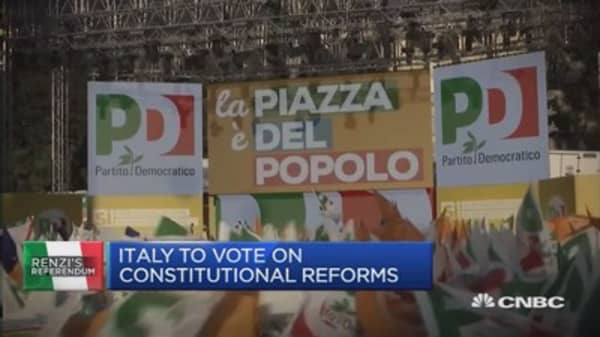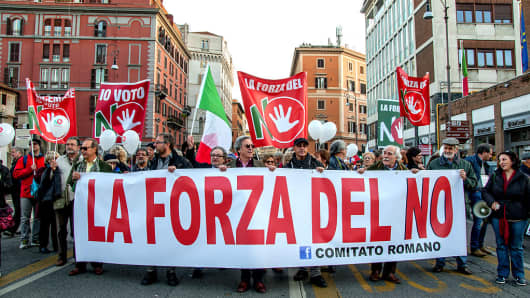The Five Star movement is calling for snap elections if the referendum vote is a no. But under the current mix of old and new electoral laws they'd still struggle to rule because they are unwilling to form coalitions with established parties.
Investors are now wondering if this could ultimately mean a referendum on euro membership at some point in the future. The key here is that Italy's constitution as It stands does not allow referendums on international treaties. And current events prove how tough it is to change it.
The additional kicker here is that the constitutional court will rule of the legality of the new electoral law after this referendum so things could change again anyway. We could even go back to the old system - and likely not in the Five Star movement's favor.
For now there are far more pressing concerns. What happens on Monday morning if Italians vote No this weekend? Renzi has promised to resign. The President must then ask someone to step in. The government have indicated that this would happen quickly to try and limit any potential market instability.
In this case, watch the banks as the outlet for investor fears - even though the banking sector is already down 48 percent so far this year. Finance Minister Pier Carlo Padoan has suggested that even if the No vote wins, Renzi's pledge to tackle the issue of non performing loans and recapitalise stricken lender Banca Monte Paschi dei Siena with the help of private investors could go ahead. But will reluctant investors still want to take part?
Whether it's a technocrat or someone from the current government, the next leader will also then be tasked with completing the budget for 2017, finalising the electoral law, and preparing the country for fresh elections next year.
If the Yes vote wins and Renzi stays, I doubt the plan will change too much, even if elections are pushed back to 2018. Investors will probably lose interest in this event quite quickly.
So what does this all mean?
Well the good news is that Italian chief executives and business leaders have told me numerous times in the last five years, this country adopts a carry-on-regardless attitude to political instability. I wonder if the same holds true today.
The bad news is - in either scenario, further economic reforms in Italy will take a back seat.
And while a government change won't help investor confidence in the short-term, It's fair to say those arguing for a bolder, more comprehensive solution for the Italian banking sector will be saying exactly the same after this referendum as they were before. Meaning little additional support unless the market forces it. No matter who wins.





